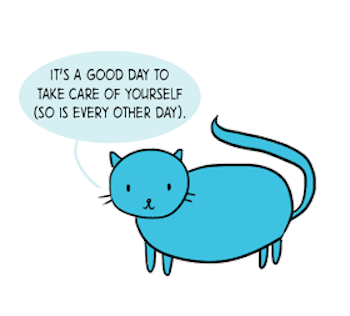by Julie Karaus
It’s that time of year again. The birds are singing, the flowers are blooming, and once again, you might have left one or two things to the last minute, or perhaps it’s just exam time and all of the knowledge that you acquired, or were expected to acquire, must be called up for the final exam. So how do you cope with the level of stress related to having multiple time sensitive tasks?
At my ripe, undisclosed age I have survived many finals weeks as an undergraduate student, a graduate student, and a faculty member, and I have taken note of certain habits that make the whole ordeal a bit less painful and perhaps more fruitful as well. Most of this stuff is common sense, but it never hurts to be reminded.
Breathe: This might sound like hippie-mumbo jumbo, but there is a reason that Yoga is the oldest discipline-based exercise practice in the world. When you feel writing or study-related anxiety setting in—the fog, the increase in heartbeat, the sense of losing control—stop. Close your eyes and take a deep breath. Connect with it. Try to imagine your lungs filling up your back body to the point that those back muscles hunched from typing and reading are forced to engage. Release that breath in an audible sigh. Repeat. Do this as much as you need. It cannot hurt you.
Prioritize & make lists: This will make you more mindful as you move through the series of items or tasks that need doing. After your deep breaths, think about all the things you have on your plate. Make sure items such as eating, sleeping, exercising, or calling your best friend make the cut. Create your list with a mind toward timelines: think about who you are as a learner, writer, researcher, and order operations according to the task and how you might best accomplish that task. Many folks read/study most effectively in the morning, and hit a second wind for writing in the evening. If this is you, make time for reading in the morning then schedule the writing for the evening. Organize and conquer.
Exercise: Physical activity helps you get out of your brain and into your body. While you are making that list, make sure you schedule some time to get your body moving. Do what you love and are comfortable with. This might not be the time to start Crossfit or extreme mountain biking, but if that is what you already do to unwind, make time for it. After studying all morning, a brisk walk or even a short 30-minute run will give you some time to reflect and digest the information you just absorbed. This will also help you sleep better. Reward yourself for all that hard work!
Sleep, eat, and stay hydrated: I know this might seem super commonsense but these are often the things that fall by the wayside when we begin to feel rushed! Neither the body nor the brain can function without these basic needs. Eat food that gives you true energy, not a sugar or caffeine rush. Keep things like fruit and nuts around for instant, sustainable energy. Drink water. While you are making that list and organizing for task completion, schedule in some time to sleep. Taking an exam well rested and refreshed is more effective than taking it after a cram session that leaves you mentally feeble and exhausted.
Call someone who cares: If you make a phone call to someone who cares about you, they might ask you what you’ve been up to. You might have to explain mitosis, or the organization strategy for that essay you’ve been putting off. Talking out your specific plan might help you get your thoughts in order before starting that next essay.
Everyone learns, composes, and copes with stress differently, but remaining aware of your very human self and the needs of your body and mind will ensure that you come out of this semester healthy in both.
And have a look at this short video about Exam Stress from The Physiological Society.

